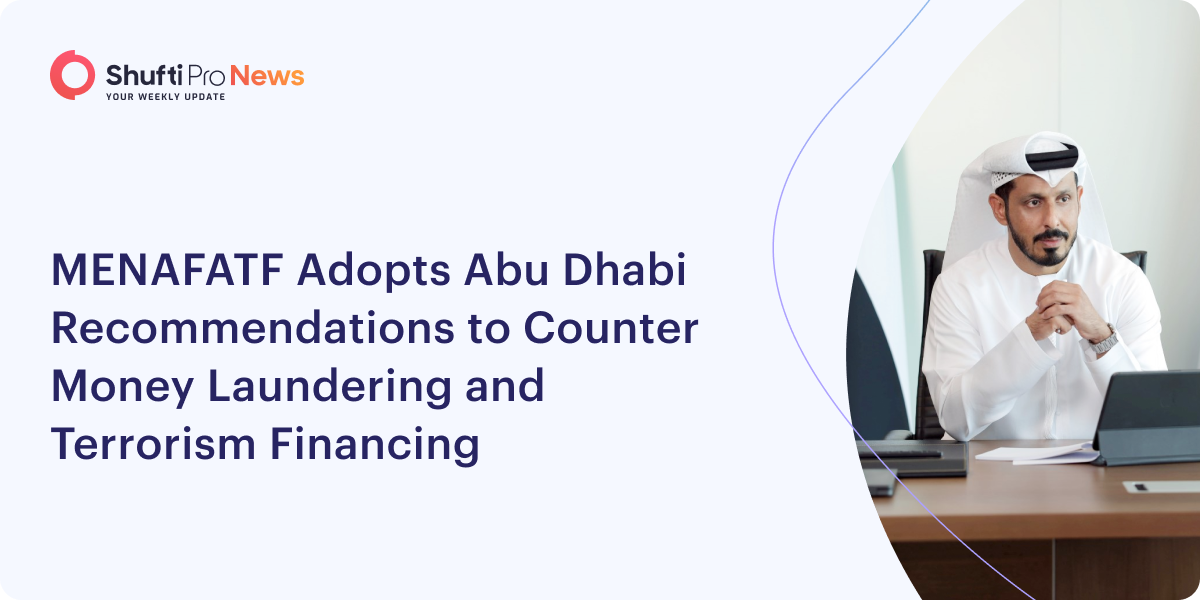MENAFATF Adopts Abu Dhabi Recommendations to Counter Money Laundering and Terrorism Financing

An international group based on the FATF format, MENAFATF, has adopted the Abu Dhabi recommendations regarding regional measures to curb terrorist financing and money laundering.
As a representative body of the Financial Action Task Force (FATF)-style regional group, the MENAFATF adopted the Abu Dhabi guidelines for preventing money laundering and terrorist financing in the region. MENAFATF member states have undertaken 24 commitments to intensify regional efforts against terrorism financing and money laundering.
Sheikh Abdullah bin Zayed Al Nahyan, UAE Foreign Minister and Chairman of the National Strategy Committee for Anti-Money Laundering and Counter-Terrorism Financing, endorsed the recommendations of the MENAFATF workshop on regional frameworks and capacity building. The UAE Executive Office hosted the conference on Counter-Terrorism Financing and Anti-Money Laundering (EO AML/CTF). Hamid Al Zaabi, Director-General of EO AML/CTF, noted that the MENAFATF plenary adopted the Abu Dhabi recommendations, representing a significant step forward.
He explained: “The 2023 MENAFATF Typologies and Capacity Building Workshop, held in the UAE, provided a strong platform for sharing new typologies and updating existing ones while facilitating the exchange of best practices. With over 100 participants from 21 countries that make up MENAFATF, as well as observers and representatives from other FATF-Style Regional Bodies (FSRBs) and international organisations, the workshop drew together some of the best minds in combating financial crime,” continuing, “The Abu Dhabi recommendations are a worthy output from these discussions and create a valuable tool for raising standards through effective international cooperation. They reflect the firm commitment of the UAE to adopting best practices in combating money laundering and financing terrorism in the MENA region,” Zaabi added.
MENAFATF member states have committed to the following best practice commitments as part of the Abu Dhabi recommendations:
- Develop public-private partnerships to enhance anti-money laundering and counter-terrorism financing systems by establishing committees and task forces.
- Clear legal frameworks must govern public-private information exchange.
- Member countries can aid in combating ML/TF crimes by utilising their methods and patterns.
- Members are encouraged to contribute to a regional assessment of ML/TF risks.
- Prioritise asset recovery and strengthen MENAFATF cooperation in this area.
- Ensure that all legal persons, including the Ultimate Beneficial Owner, are treated transparently.
- To limit TF abuse by NPOs, NPOs should use electronic payments.
- Provide guidelines to countries on how to prevent terrorist groups from misusing NPOs.
- UNSCR 2462 stipulates that countries must identify and allocate supervisory resources based on the risk-based approach when determining the subgroups covered by FATF’s definition.
- To ensure that NPOs are not abused by partners, intermediaries, or representatives during program implementation, encourage them to educate them.
- Mitigation of TF risks should not hinder NPOs from achieving their goals.
- Due to the rapid development of VAs, MENAFATF countries should understand Recommendation 15’s requirements.
- Promote the development of capacities in VA with the competent authorities. This is mainly for supervising, controlling, investigating and managing confiscated assets and the potential for their misuse.
- Working with the private sector to help mitigate virtual assistant risks by identifying and adopting new technologies.
- Encourage using best practices, including task forces (working groups) and enhancing national cooperation between competent authorities when dealing with VA issues.
- FATF and UN Monitoring Group publications provide techniques, indicators, and methods for ML/TF in the MENAFATF region.
- Issuing instructions to countries to complete or begin evaluating DNFBP sectors and emphasising the need to allocate supervision resources to the riskiest sectors.
- Ensure that DNFBPs are more effectively regulated and regulated.
- For compliance with FATF standards, the United Arab Emirates can be cited as a model for DNFBP regulation.
- The updated FATF amendments should be incorporated into member states’ BO identification procedures.
- FSRB member countries will share their experiences concerning human trafficking, migrant smuggling, and wildlife trafficking.
- Raising members’ awareness of cybercrime risks, particularly ransomware and associated payment methods, such as virtual assistants and virtual assistant apps.
- Understand the methods, patterns, and indicators of corruption and drug trafficking crimes in other FSRB member countries.
- To address the impact of environmental crimes and money laundering risks in the MENA region, establish specialised working groups.
Suggested Read:
COURT CONVICTS DEFENDANT OF DEFALCATION OF PUBLIC FUNDS IN ABU DHABI

 Explore Now
Explore Now













